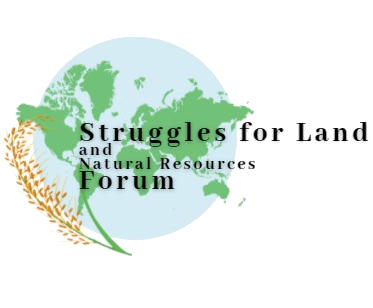The Struggles for Land Podcast

The Struggles for Land Podcast gives a voice to those fighting for access to land and defending the commons.
Focusing on one major theme per episode, the podcast interviews and brings together farmers' organizations, social movements, environmental protection and the defense of the commons, as well as researchers and consumer associations. These exchanges between actors from the four corners of the globe enable us to better understand the local and international stakes, the successes and the difficulties of these mobilizations, which all have in common that they are working towards a society based on peasant and feminist agriculture in harmony with ecosystems.
You can listen to all the episodes on this page and on the various platforms:
Subscribe to our newsletter to be informed when future episodes are released:
Season 1
- Episode 1 - Land grabbing
This first episode of the Luttes pour la Terre Podcast is devoted to the phenomenon of land grabbing, the taking of land by companies or states to the detriment of communities and society as a whole.
This first episode gathers three testimonies to better understand this phenomenon and its dramatic consequences.
- Mamy Rakotondrainibe from the TANY collective, a group of people fighting against land grabbing in Madagascar. In particular, she helped us to understand the historical origins of the land grabbing to which the Malagasy population has fallen victim.
- Ange-David Baimey, head of the Africa program at GRAIN, an NGO that records and analyzes cases of land grabbing and provides practical support to the victims. He gave us an idea of the scale of land grabbing, particularly in Africa.
- Mathieu Perdriault, coordinator of AGTER, a French association that leads a global network of reflection and proposals on improving the governance of land and natural resources, was the initiator of FMAT 2016 and today facilitates, with CERAI, the FLT process. His presentation gave us an insight into more insidious forms of land grabbing, such as financialization and land concentration.
We hope you enjoy listening to this podcast and learn more about this major issue.
- Episode 2 - Commons and communities
We are living in a global context where the increasing concentration of land and natural resources through grabbing and appropriation is an increasingly tangible reality. Environmental and social issues are becoming ever more pressing, and it is essential to rethink our relationship with the commons that concern us all: land, natural resources and ecosystems. Local communities seem best placed to put solidarity back at the heart of these concerns, and to take better account of the interdependencies between human beings and with nature. To tackle this subject, we have chosen to bypass the much-debated question of the precise definition of the commons, by focusing on concrete uses and practices, in order to understand how communities can organize themselves to manage these commons collectively and sustainably. To this end, we give the floor to three leading players in an episode combining inspiring initiatives, militant experience and philosophy.
You'll hear from Fanny Métrat, a member of the French farmers' union Confédération Paysanne, Aïchata Koné, from UACDDDD, a group of Malian associations fighting for development and the rights of the poor, and Sophie Gosselin, a philosophy researcher working on the philosophical consequences of the ecological crisis and a specialist in the commons.
We hope you enjoy your listening experience, and we'd like to extend our warmest thanks to the many volunteers who provided the audio translations and music!
- Episode 3: Access to water
Access to water is a major issue: 85% of wetlands have disappeared, and climate change and overexploitation of water resources threaten nearly 2 billion urban dwellers by 2050.
Faced with this crisis, rural populations are the first to be affected. The appropriation of water by agro-industrial and governmental actors compromises their survival. Yet traditional and agro-ecological practices offer sustainable solutions, reducing pollution and enabling soil and groundwater regeneration.
In this episode, we explore these issues with Anne-Morwenn Pastier, hydrologist and member of the Bassines Non Merci collective, Massa Koné, Secretary General of the Convergence Globale des Luttes pour la Terre et l'Eau en Afrique de l'Ouest and Jean-Louis Couture, agricultural engineer specializing in natural resource management. They will highlight the importance of structuring social and community struggles, and ways of rethinking collective water management.
- Episode 4: Feeding oneself: cross-cutting struggles between precarious urban dwellers and family farmers
We are delighted to present the fourth episode of the Struggles for the Earth Podcast! This podcast in four languages gives a voice to those who, day after day, fight to defend the earth and the commons. In this episode, we delve into the heart of the struggles for access to healthy, sustainable and fair food, exploring the essential convergences between small-scale producers and consumer associations.
We are honored to welcome three guests who will give us an overview of these issues: Philip Seufert, member of the FIAN International team, a leading NGO in the fight for the right to food and nutrition through the defense of human rights; Boris Tavernier, founder and CEO of VRAC, a French network that is revolutionizing joint purchasing; and Michele Russo, prickly pear grower in Sicily and member of the Le Galline Felici Consortium, a model of solidarity-based, nature-friendly agriculture.
This episode tackles an alarming reality: almost 10% of the world's population was undernourished in 2020, and a third had no access to adequate food. How did we get here? How are land grabbing, resource concentration and the rise of agribusiness exacerbating this situation? Together, we shed light on the mechanisms of oppression that threaten both human rights and the environment.
Yet hope remains. Peasant agriculture, which feeds between 70% and 80% of the world's population, is proving to be a crucial solution to today's challenges. It preserves biodiversity, maintains natural cycles and ensures the transmission of ancestral knowledge. But this vital sector is itself under threat, with 80% of peasant farmers among the most affected by hunger and 70% living in extreme poverty.
Against this backdrop, resistance is getting organized. VRAC and Le Galline Felici are at the forefront of the fight for food democracy. By strengthening links between producers and consumers, they are working for sustainable, local and fair food. This food model, based on solidarity and respect for natural cycles, is a powerful response to the excesses of agribusiness.
In this episode, we highlight these inspiring initiatives that are paving the way for a future where food once again becomes a common good, serving communities and nature.
We invite you to listen to this episode, share it with those around you, and continue to mobilize in defense of the commons and human rights. Together, we can build fairer, more sustainable food systems.
- Episode 5: Young people fighting for land
In this episode, we look at a crucial issue for the future of agriculture and our planet: young people's access to land. We are honored to welcome Jean-Mathieu Thévenot, European youth representative of Via Campesina Europe, a member of Youth For Climate France, as well as Andrea Toro, Alfredo Guamaní and Gregory Jiménez from the Choco Andino Youth Network in Ecuador. Global agriculture is facing a generational renewal crisis.
In Europe, for example, the average age of farmers is approaching 60. Young people are finding it increasingly difficult to take over family farms or to set up as farmers. There are many reasons for this: the structure of agricultural and land markets, low margins left by retailers, land concentration and land grabs for agribusiness. This context is leading to the destructuring of rural communities and the disappearance of traditional agricultural knowledge and practices. As a result, many young people are leaving the countryside for the cities, often without finding better living conditions.
Without generational renewal, peasant agriculture will not be able to maintain itself. This poses a threat not only to rural communities, but also to the entire world population, which depends to a large extent on this agriculture for its food. What's more, with 40% of the world's jobs linked to agriculture, the difficulty for young people to set up in agriculture could lead to the loss of 3 billion jobs within two decades, turning our societies upside down. Small-scale farming also plays a key role in protecting the environment. Its logic of intergenerational transmission and maintenance of soil fertility is essential to climatic equilibrium and biodiversity, in contrast to agro-industrial agriculture and its focus on exports, which jeopardizes the environment, soil and human health.
In this podcast, we'd like to show you how young people are organizing themselves in the face of these challenges. Each in their own territory, their struggles are deeply linked by shared ecological, peasant and social concerns. The convergence of these movements is essential to ensure a future where young people have access to land and natural resources, and where peasant agriculture continues to thrive. The young peasants of Via Campesina Europe are campaigning for better access to land and for the preservation of peasant agriculture, the only viable agricultural model for the future. Youth For Climate activists oppose environmentally destructive projects and support farmers in their struggle to protect agricultural land. They call for a convergence of struggles between urban activists and farmers for a common sustainable future. On the social front, initiatives such as those of the Choco Andino Youth Network in Ecuador demonstrate the importance of revitalizing rural areas. This network combines the fight against destructive mining projects with the creation of cultural and educational events to make rural life desirable and viable.
It is therefore urgent to strengthen alliances between peasant, ecological and citizen movements, particularly around the issue of young people's access to land. It's a question of survival for agriculture, for rural communities, and for our planet as a whole. Through this episode, the Podcast des Luttes pour la Terre hopes, on its own scale, to point the way towards this necessary convergence.
- Episode 6: A cross-section of feminist and agro-ecological struggles
In this episode of the Struggles for the Earth podcast, we explore an issue often unfairly treated as disconnected from the other struggles we discuss in this podcast: women's access to land. To talk about it, three guests with inspiring backgrounds shed light on feminist struggles in the agricultural field:
- Mariam Sow(Enda Pronat, Senegal): campaigner for the recognition of women's role in agriculture and the promotion of agro-ecological practices.
- Mazé Morais(CONTAG, Brazil): coordinator of the March of the Daisies, a massive mobilization of rural women workers in Latin America.
- Héloïse Prévost: Senior lecturer in sociology, specializing in feminist agro-ecological movements in Brazil.
Through their testimonies, we discover the systematic inequalities women face, both legally and socioculturally: limited access to property, patriarchal vision of agricultural institutions, discrimination in land inheritance, and violence. Despite these obstacles, feminist movements and alliances are mobilizing to defend their rights to land and natural resources worldwide.
This episode highlights the collective struggles essential to guaranteeing equality and profoundly transforming our societies. Indeed, the discussions also show why women's access to land is central to the defense of peasant farming, and thus a key issue for environmental protection and access to healthy agriculture.
- Episode 7: The struggle of the landless
In this episode of the Luttes pour la Terre podcast, we delve into the crucial issues of land inequality and migration linked to the loss of land. Today's agricultural world is marked by major imbalances: 3% of farms own 50% of cultivated land, endangering peasants who lose access to resources essential to their survival.
We explore how land grabbing destabilizes populations, forcing many of them to migrate, often in very precarious conditions. The status of the landless, linked to historical discrimination and colonial logics, is highlighted, with emblematic movements and organizations in Brazil, India and France.
For this we receive :
- Ramesh Sharma, coordinator of Ekta Parishad, a non-violent mass movement in India, founded in 1991. It fights for the rights of rural and indigenous communities, with particular emphasis on access to land, water and forest resources.
- Idriss et Aline pour A4, une Association d'Accueil en Agriculture et Artisanat, is an organization whose aim is to build a dynamic of reception, training, access to work and administrative support for people with or without papers, urban or rural, in the fields of agriculture and crafts.
- Cassia Bechara, representative of the Mouvement des Sans-Terre (MST), one of the world's largest social organizations fighting for agrarian reform and social justice.
This episode reminds us that the struggle for access to land is a struggle for dignity, social justice and recognition of the know-how of rural and migrant communities.
To find out what's happening at the FLT, go to the "Ongoingstruggles" page.
To find out more about FLT, see our FLT overview.



